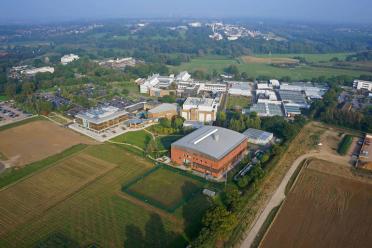PhD by experience
We speak to Dr Darren Heavens, who after over 30 years’ experience in genomics research; from pig breeding to improving wheat yield, went down an alternative PhD route.
Over 30 years’ experience in genomics - from helping herdsmen, to EI colleagues then helping him realise the potential of his method madness - we speak to Dr Darren Heavens who went down an alternative PhD route.
My first genomics job was for a pig breeding company. They were looking for genes associated with traits of economic interest such as litter size and coat colour. We screened diverse breeds for variants that were associated with different phenotypes.
Back then, I was extracting DNA and performing -PCR-RFLPs on two thousand samples a month. Initially, these were blood samples but then I developed a method to extract the DNA from hair roots which meant that samples could be collected by herdsmen rather than vets, making the screening process much cheaper. This was my first foray into method development, something that I still enjoy today.
I then went on to work for a start-up company from the Department of Genetics at Cambridge University, working on metabolic diseases such as diabetes before working in human cancer genomics for eight years. I then came to Norwich Research Park 11 years ago to work on plants, microbes and animals. In total, I now have over 30 years’ experience in the industry.

I was in the fortunate position that I had been involved in a number of different projects at EI which led to various publications. Some of these included innovative library construction approaches that I had developed such as a pipeline for the high-throughput sequencing of Bacterial Artificial Chromosomes (BACs) and new ways to think about constructing long mate pair and amplification- free, paired end libraries.
These protocols maximised the spatial information they provided and had a positive effect in several high profile de novo genome assembly projects including those for barley* and wheat**. When published these were the most contiguous assemblies generated and have gone on to be cited many times.
I was then made aware that UEA offered a ‘PhD by Publication’ route and reviewing my work I felt that I had sufficient volume and quality of work to complete a thesis. I then took advice from some colleagues at EI and they agreed, so I set about finding out how to go about it.
A PhD by publication isn’t the conventional route and although UEA offer the qualification, nobody in the Graduate Studies Office (GSO) had experience of anyone undertaking one. No one had registered for at least five years.
Initially, it seemed like there was always one more form to fill in or approval needed from one more person, but I got there in the end. It took just over a year from when I first enquired about registering before I officially started.


At the end of process, I can look back and say that, in going through all those hoops, it will be more straightforward for the next person wanting to do it.

I also had to contend with writing while still working which meant that I had to plan my time efficiently. You get six months to write-up the thesis and although I got a concession to write 30,000 words, rather than the usual 20,000 limit, ensuring that it was completed on time was demanding. EI did allow to me work from home for a number of days but it also meant working a lot of evenings and weekends and using some of my holiday. My wife was a great support and gave me the space to write it and get it handed in on time.
At the end of process, I was proud of what I had produced. I was fortunate, in that the thesis pretty much wrote itself and I didn’t suffer from writer's block. At one stage I had 45,000 words so it needed a serious edit, but when I read through the final version there was a good narrative and I felt that it was more than worthy of the award.


There won’t be many opportunities for you to spend a few hours locked in a room with a couple of your peers to talk just about your research and the impact that it will have.

Before starting I spoke with Ian Bedford, from John Innes Centre, who was the very first Norwich Research Park PhD by Publication student and his insight was invaluable. Looking back it would have been really useful to have spoken to more people who had taken this route even though they are a rare breed. I am looking forward to sharing my experiences with future candidates in the same way that Ian did for me.
During the registration process, it did feel like the blind leading the blind but in the end that worked in my favour as it gave me greater ownership of the process.
Finding suitable examiners was also interesting, and because I was the first to undertake this route for a while, I was missed off the automated email letting me know we should inform the GSO of our choices so everything became a bit rushed.
As an internal candidate, I needed two externals and they couldn’t be anyone that I or my supervisory team had worked with in the last three years which limited the options.
Thankfully, we managed to find a couple of suitable people but it was an unnecessary stress when I should have been concentrating on getting the thesis finished. I would recommend that any PhD candidate get these sorted at least three months before there submission deadline, if possible.

As well as Ian Bedford, I spoke with a number of people who undertook conventional PhDs as the thesis aspect was in essence the same. Neil Hall, Iain Macaulay and Wilfried Haerty were my EI supervisory team and they all offered useful advice both on writing and defending my thesis.
The GSO team were also very good and they run some excellent courses. The ones on thesis writing and the viva workshop run by Steph Bornemann were very informative and I would recommend that every PhD student should attend them.
Although my route to writing a PhD thesis was unconventional I still had a traditional viva. Although you hear some horror stories of them going on forever mine was quite short at just over 90 minutes. I got an opportunity to summarise my work and then had some really interesting questions about how I had drawn some of my conclusions.
I felt the examiners had done a good job in getting me to reveal my thought processes for developing the methods I presented in my thesis. For me, it felt like a real two-way debate between me and my examiners. There was also an interesting ten-minute discussion towards the end on how we felt technology would evolve over the next five years. In the end, they only found five minor typing/grammar corrections so technically I had passed without the need for corrections.
To sum everything up, completing a thesis is a rewarding experience and is a great record of the body of work that you have undertaken. There won’t be many opportunities for you to spend a few hours locked in a room with a couple of your peers to talk just about your research and the impact that it will have. For me, it realised eight years of working at EI and highlighted what I had actually achieved. I would happily go and do it all again!